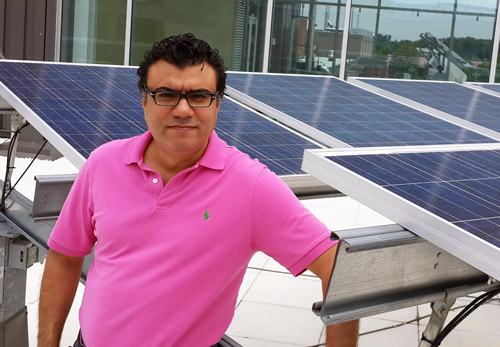
Imagine a pipe with water flowing through it. It’s not too hard for an engineer to gather information about the volume of water and the pipe geometry to make accurate predictions about how fast the water will flow or how much pumping power is required to produce this flow rate.
But now imagine the pipe contains water and gas, such as steam or air. Or there are two liquids – say, water and oil. Or there are solids suspended in the water. All of these situations are much more common in real-world engineering applications like power generation, water treatment and gas and oil transportation, and making predictions becomes much more complicated.
Engineering professor Wael Ahmed doesn’t mind complicated. In fact, he’s fascinated by the process of analyzing multi-phase flow – the technical term for these situations. “There are no simple formulas because there can be so many different factors,” he explains.
Ahmed joined the U of G faculty this summer and is beginning a research program aimed at understanding these complex flows in order to design more efficient and sustainable systems.
He gives the example of current renewable energy systems, which are quite low in efficiency. They’re expensive to build and paying back those initial costs may take a long time. Ahmed believes that a detailed analysis of the design and materials used for the internal components, along with an understanding of multi-phase flow and heat transfer, can lead to improvements in efficiency. Making it possible to harvest more of the energy could increase public investment in these systems. “Multi-phase flow analysis is the root of efficient and sustainable energy systems,” he says.
He adds that there are also multi-phase flow applications in other areas of energy production, such as the extraction of oil from the Canadian oil sands. “Developing renewable energy is important, but being able to get oil at reduced costs is also important to meet our energy needs,” he says.
Ahmed was born in Egypt and grew up in the city of Alexandria. He was always interested in fine art and considered going into architecture. But when he read about mechanical engineering, he found his real passion. He graduated at the top of his university class in 1995. After finishing his master’s degree at Alexandria University, he came to McMaster University in 2001 to continue his studies.
“Although the transition process was challenging, I felt that in Canada I could be successful by being focused, working hard and staying true to myself,” Ahmed says.
When he completed his PhD in 2005, Ahmed took a position with Atomic Energy of Canada Limited in Chalk River, Ont. His next position was in Toronto as a senior analyst at Nuclear Safety Solution-AMEC. The work appealed to Ahmed’s love of problem-solving and he was able to get some grants to continue his research, as well as run several commercials projects.
By 2009, Ahmed realized that his love of research was steering him back in the direction of academia. He took a position at King Fahad University of Petroleum and Minerals in Dhahran, Saudi Arabia. “I was switching from nuclear power to oil and gas applications, but my work was still focused on multi-phase flow,” he says.
His third child, a daughter, was born in Saudi Arabia. Thanks to the stories told by her two older brothers, she’s always been excited about coming to Canada to play in the snow. In fact, after four years in Saudi Arabia, the family was keen to return to Canada, and Ahmed felt the position he now has at U of G, with its emphasis on energy, would be a good fit.
Ahmed’s wife is an art teacher and potter – they met in an art gallery in Alexandria – and Ahmed likes to paint when he has time. “Every time I go to an art supply store, I see something new I just have to buy,” he says, “but I have a lot of unfinished paintings that my wife says I need to complete.” He also enjoys photography.
Ahmed is looking forward to continuing his research and working with his Guelph colleagues. He’s confident that the academic life is where he wants to be.
“I am glad I spent those years working in industry,” he says. “That was where I realized that I love research. I believe now that I was meant to be an academic from the beginning, but my time in industry has given me a better understanding of what is going on and what is needed from young engineers. I came back to academia with lots of inspiration and ideas about what I could research and areas where improvement is needed.”